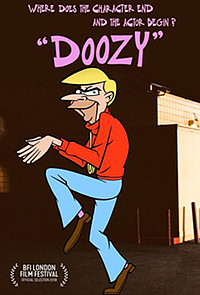| SHADOWS ON THE WALL | REVIEWS | NEWS | FESTIVAL | AWARDS | Q&A | ABOUT | TALKBACK | |||||||||||||||||||||
 Shadows off the beaten path Shadows off the beaten pathIndies, foreign, docs, revivals and shorts...
On this page:
AMAZING GRACE |
DOOZY |
LAST BREATH
| |||||||||||||||||||||
| See also: SHADOWS FILM FESTIVAL | Last update 21.Apr.19 | |||||||||||||||||||||
|
Amazing Grace Review by Rich Cline |  MUST MUST  SEE SEE
| |||||||||||||||||||||
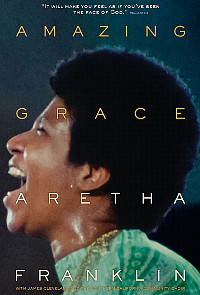 dir Sydney Pollack, Alan Elliott prd Alan Elliott, Joe Boyd, Aretha Franklin, Rob Johnson, Chiemi Karasawa with Aretha Franklin, James Cleveland, Alexander Hamilton, CL Franklin, Sydney Pollack, Bernard Purdie, Cornell Dupree, Chuck Rainey, Kenny Luper, Clara Ward, Mick Jagger, Charlie Watts release US 5.Apr.19, UK 10.May.19 18/US 1h29 |
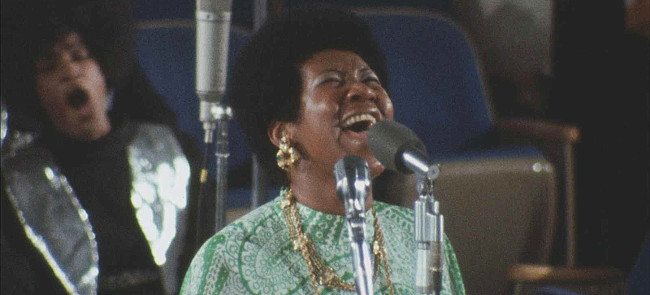 With its release delayed for nearly half a century, this concert film captures Aretha Franklin as she returns to her roots to record a double album of gospel music for a live audience. Due to technical issues, director Sydney Pollack was unable to finish the film before his death in 2008, so former music executive Alan Elliott took over. The completed film is pure and unforgettable. At the peak of her fame in January 1972, the 29-year-old Franklin recorded an album of hymns and gospel songs, backed by James Cleveland's Southern California Community Choir. Over two evenings at the New Temple Missionary Baptist Church in Watts, her epic performance was documented by five cameras, shooting more than 20 hours of footage. The bestselling album is considered one of the greatest recordings of all time; the film was shelved due to a severe audio-sync error and subsequent legal issues. Digital technology solved the first problem, while Franklin's family solved the second. The concert is intercut seamlessly with rehearsal clips in which Franklin interacts with the musicians, and there are background glimpses of the young Pollack directing his crew. But there's no other context, as the focus is on Franklin's passionate performance from the pulpit. It might have been nice to have insight into how Franklin was coping with fame or how she felt about returning to her roots. And yet her her face radiates joy, and she's so lost in the music that she never speaks to the congregation. The camerawork is terrific, capturing vivid, sweat-beaded closeups while placing the music within this setting, complete with lighting rigs, microphones and a mesh of cables, and an audience that can't sit still. While the audio is crystal clear, the imagery has a refreshing 16mm grain. On the title track, Franklin's voice is so piercingly powerful that the choir behind her loses their cool. As they sway, shout and uncontrollably leap to their feet, Cleveland is reduced to sobbing tears. It's simply spine-tingling. On the second night, her preacher father CL turns up with her mentor Ward to deliver a mini-sermon introduction, then stays around to mop his daughter's brow. Oddly, there isn't a credited director on the film. Elliott completed the project, and Jeff Buchanan provided the liquid, knowing editing. But it's Pollack's approach to composition and camerawork that captures Franklin so expertly. The result is part worship service and part recording session, a transcendent celebration of gospel music from the queen herself.
| ||||||||||||||||||||
|
Doozy Review by Rich Cline | 

| 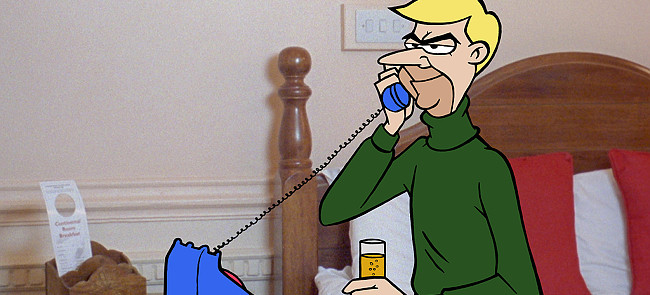 This offbeat documentary about irrepressible actor-comic Paul Lynde refuses to take the usual route through his life, opting for a wider academic exploration of fame and sexuality while indulging in some animated flights of fancy. Yes, there are a range of references to his Ohio roots, but filmmaker Richard Squires also mixes Hanna-Barbera style animation to archly dramatise events in real-world locations. The resulting movie is resolutely quirky. The film's structure is fragmented and experimental. In his sleepy hometown Mount Vernon, Ohio, actors are preparing a play about Lynde. In his yellow Thunderbird, housed in a Paul Lynde exhibition, a radio programme features clips of his comical responses to talk show hosts. The film is a riot of mixed references to Lynde and his work. Interviews with experts are delivered in Hollywood Squares-style sets, while two school friends appear in what looks like their home. Meanwhile, animated segments feature "Clovis the cartoon villain" (voiced by McKinney), who re-enacts scenes from Lynde's life. Intriguingly, the film includes no clips from Lynde's movies or TV series (there's one talk-show moment), using stills with the audio track to force viewers to use their imaginations. Squires continually plays with imagery and sound, which adds an intriguing slant to the entire movie. And the colourfully costumed professors, animators and psychologists who speak to-camera dig deeper into Lynde's life and career, exploring the complicated nature of both his public image and his private life. Alongside this, it's frustrating that the dramatised scenes are so oddly under-worked. They're also apocryphal, which may be the point. Lynde was one of the most unusual stars in Hollywood history, obviously gay without being out. Still, he managed to be a leading man as an actor, a series of iconic melodramatic cartoon villains and a beloved game show pundit. Audiences adored his signature brand of racy innuendo, delivered with an infectiously giggling sneer that eliminated any real threat. So in the 60s and 70s, they were almost willing to accept his studio-manufactured image as a playboy with a never-ending stream of girlfriends. The low-key but audacious nature of this documentary may put some Lynde fans off, simply because it seems to deepen rather than clarify the mystery about him. But there's plenty of gristle in the relatively brief running time. Squires' intriguing central question is where the character ends and the actor begins, although this isn't specifically addressed in a way that connects with the viewer. So while it's thoughtful and occasionally insightful, the film ends up telling us more about society than about Lynde.
|
| Last Breath Review by Rich Cline | 
| 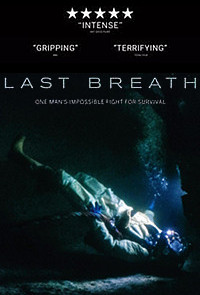 dir Alex Parkinson, Richard da Costa scr Alex Parkinson prd Al Morrow, Richard da Costa, Stewart Le Marechal, Angus Lamont, Dylan Williams, Alex Parkinson with Chris Lemons, Dave Yuasa, Duncan Allcock, Morag Martin, Craig Frederick, Michal Cicharski, Stuart Anderson release UK 5.Apr.19 18/UK BBC 1h26 See also the feature: 
| 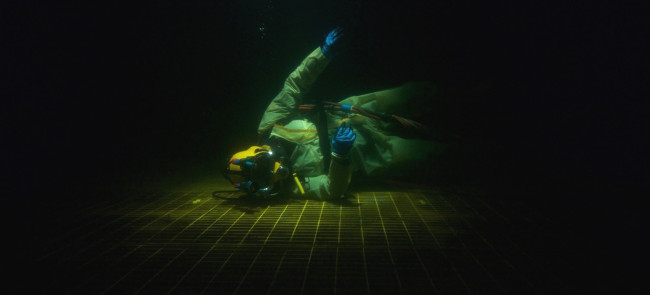 A documentary that plays out like a harrowing underwater survival thriller, this film combines real footage with sharply well-shot re-enacted sequences. The result is both a riveting drama and a glimpse into a profession probably few have ever thought about before: deep-sea oil-well repair divers. It may feel a bit too brisk, but the tricky editing tells the story with a maximum kick. In the North Sea off the coast of Scotland in September 2012, the dive support ship Topaz heads out to repair an underwater oil platform. Three divers are put into tanks to prepare for the undersea pressure: lead Dave, second Chris and bellman Duncan. But as they are beginning their work, Topaz's control system malfunctions, causing the ship to drift dangerously. Chris' umbilical is snapped, leaving him unattached on the seabed with only five minutes of breathable air. But it takes Dave, Duncan and the ship's crew more than a half hour to find him. This is recounted with to-camera interviews, home video footage, the ship's camera archive and beautifully shot new footage that recreates the scenes in between. The interviews are fascinating, from Dave's startlingly matter-of-fact reactions to Duncan's much more personal ones, since he was so close to Chris and his fiancee Morag. The story unfolds chronologically as a race against time, with a fascinating look at the equipment on the ship and the methods these divers use every day. Directors Parkinson and da Costa create a driving narrative with a big mystery in the centre: what has happened to Chris? The filmmakers deliberately hold this back until later, when they fill in the details in a way that's powerfully emotional but never manipulative. Each person who recounts an angle to the story includes his or her intense feelings every step of the way, which gives the audience plenty to grab hold of as the tension rises. The film has a remarkable sense of perspective, showing these men through their own eyes as they head off for 28 days living in tiny quarters that are like an underwater space station. They clearly get a thrill from their work, and their intrepid attitude is infectious. But there's also a sense that they are carefully wording their interviews to avoid giving away the ending (even if it seems obvious). So when the final details of the event fall into place, it feels almost anticlimactic. Still, it's an amazing story skilfully told. And it does get our minds spinning.
| 
See also: SHADOWS FILM FESTIVAL © 2019 by Rich Cline, Shadows
on the Wall
HOME | REVIEWS | NEWS | FESTIVAL | AWARDS
| Q&A | ABOUT | TALKBACK | | ||||||||||||||

